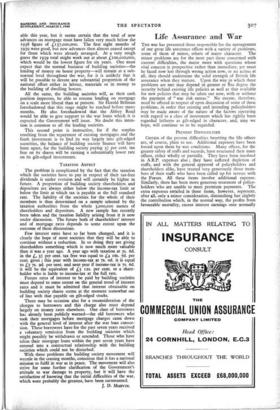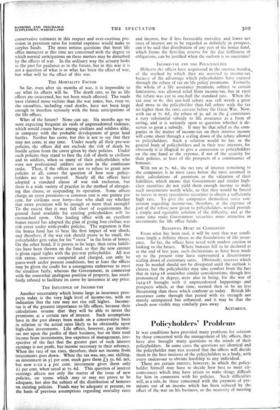Life Assurance and War
THE war has presented those responsible for the management of our great life assurance offices with a variety of problems, some of them of minor, others of major character. The minor problems are for the most part those concerned with current difficulties, the major more with questions whose vital concern is prospective rather than immediate, yet must be faced now lest through wrong action now, or no action at all, they should undermine the solid strength of British life assurance when they mature. Upon the way in which these problems are met may depend in greater or Tess degree the security behind existing life policies as well as that available for new policies that may be taken out now, with or without the payment of " war risk extras." No excuse, therefore, need be offered in respect of open discussion of some of these problems, in order that existing and intending policyholders may be made aware of the nature of the factors operating with regard to a class of investment which has rightly been regarded hitherto as gilt-edged in character, and, may we hope, will continue so to be regarded.
PRESENT DIFFICULTIES
Certain of the present difficulties besetting the life offices are, of course, plain to see. Additional expenses have been forced upon them by war conditions. Many offices, for the greater safety of staffs and records, have evacuated their main offices, either wholly or partially. They have been involved in A.R.P. expenses also ; they have suffered depletion of staffs, and with the general approval of policyholders and shareholders alike, have treated very generously those mem- bers of their staffs who have been called up for service with the Forces. All these items involve additional expense. Similarly, there has been more generous treatment of policy- holders who are unable to meet premium payments. The extra expenses entailed in these items, however, represent, after all, only a minor consideration, diminishing but slightly the contribution which, in the normal way, the profits from favourable mortality, excess interest earnings over normally conservative estimates in this respect and over-cautious pro- vision in premium rates for normal expenses would make to surplus funds. The more serious questions that beset life office managers at this time are concerned with the degree to which normal anticipations on these matters may be disturbed by the effects of war. In the ordinary way the actuary looks to the past for guidance as to the future, but in this war it is not a question of what is or what has been the effect of war, but what will be the effect of this war.
THE MORTALITY FACTOR
So far, even after six months of war, it is impossible to say what its effects will be. The death rate, so far as life offices are concerned, has not been much affected. The roads have claimed more victims than the war zones, but, even so, the casualties, including road deaths, have not been large enough to interfere seriously with the basic anticipations of the life offices.
What of the future? None can say. Six months ago we were expecting frequent air raids of unprecedented violence, which would create havoc among civilians and soldiers alike, in company with the probable development of great land battles. Neither has come, but this is not to say that they may not come at any time. Under nearly all their pre-war policies, the offices did not exclude the risk of death by hostile action from the cover given by their policies. Under such policies they stand to face the risk of death to civilians and to soldiers, when so many of their policyholders who were not professional soldiers are now in the combatant ranks. Then, if the offices are not to refuse to grant new policies at all, comes the question of how new policy- holders are to be covered. Nearly all the offices have adopted a standard clause of war risk exclusion, but there is a wide variety of practice in the method of abrogat- ing that clause, or suspending its operation. Some 'offices charge an extra premium—a common rate is one guinea per cent. for civilians over forty—but who shall say whether that extra premium will be enough or more than enough? To the extent that it may fall short of requirements the general fund available for existing policyholders will be encroached upon. One leading office with an excellent bonus record has adopted the plan of giving free civilian war risk cover under with-profits policies. The argument is that the bonus fund has to bear the first impact of war shock, and therefore, if the war risk should prove to be small, the policyholder gets value for his " extra " in the form of bonus. On the other hand, if it proves to be large, then extra liabili- ties have been thrown on the fund, so that the new entrant is given equal rights with the pre-war policyholder. All war risk extras, however computed and charged, can only be guess-work under present conditions, but at least the offices may be given the credit for a courageous endeavour to meet the situation fairly, whereas the Government, in connexion with the somewhat analogous position of property, has stead- fastly refused to facilitate its cover by insurance at any price.
THE INFLUENCE OF INCOME-TAX
Another uncertainty which looms large in insurance pros- pects today is the very high level of income-tax, with no indication that the rate may not rise still higher. Income- tax is of the greatest importance to life offices, because their calculations assume that they will be able to invest the premiums at a certain rate of interest. Such assumptions have in the past always been made on a conservative basis in relation to the actual rates likely to be obtainable upon high-class investments. Life offices, however, pay income- tax not upon the profits of their business, but on their total income from investments, less expenses of management, irre- spective of the fact that the greater part of such interest earnings is not profit, but income necessary to their solvency. When the rate of tax rises, therefore, their net income from investments goes down. When the tax was, say, one shilling, an investment in 31 per cent. stock gave them £3 5s. 6d. net, but now even a 4 per cent. investment gives theni only 21 per cent. when taxed at 75. 6d. This question of interest earnings affects not only the matter of the issue of new policies, on terms which may or may not prove to be adequate, but also the subject of the distribution of bonuses on existing policies. Funds may be adequate at present, on the basis of previous assumptions regarding mortality rates and interest, but if less favourable mortality and lower net rates of interest are to be regarded as definitely in prospect, can it be said that distribution of any part of the bonus fund, which forms the first-line reserve for the due fulfilment of obligations, can be justified when the outlook is so uncertain?
INCOME-TAX AND THE POLICYHOLDER
Hitherto the offices have acquiesced in the onerous burden of the method by which they are assessed to income-tax because of the advantage- which policyholders have enjoyed through the rebate of tax on life policy premiums. Formerly the whole of a life assurance premium, subject to certain limitations, was allowed relief from income-tax, but in 1916 the rebate was cut to one-half the standard rate. When the tax rose to 6s. this one-half rebate was still worth a great deal more to the policyholder than full rebate with the tax no higher than the rates current before the Great War. Now, with tax at 7s 6d., the rebate of 3s. 9d. in the constitutes a very substantial subsidy to life assurance as a form of saving, and it is seriously open to question whether it de- serves so great a subsidy. It may be that relief to the com- panies in the matter of income-tax on their interest income will come about through a scaling down of the rebate allowed to policyholders. Such a solution would be fair to the general body of policyholders and in their true interests, for obviously it is illogical to give a concession to policyholders on the one hand at the expense, if not of the security for their policies, at least of the prospects of a continuance of bonuses.
With tax at 7s. 6d., the net rate of interest remaining to the companies is in most cases below the rates assumed in their calculations of premium, or the valuation of their liabilities, which means that Government and similar high- class securities do not yield them enough income to make such investments worth while, so that they would be forced to invest in more speculative securities to obtain a sufficiently high rate. To give the companies themselves some con- cession regarding income-tax, therefore, at the expense of part of the rebate now given to policyholders, would provide a simple and equitable solution of the difficulty, and at the same time make Government securities more attractive as investments for life office funds.
RESERVES MUST BE CONSERVED
From what has been said, it will be seen that war condi- tions imply a definite threat to the foundations of life assur- ance. So far, the offices have acted with modest caution in looking to the future. Where bonuses fell to be declared as at the end of last year, such declarations as have been made up to the present time have represented a discretionary scaling down of customary rates. Obviously, reserves which may be needed should not be dissipated until the outlook is clearer, but the policyholder may take comfort from the fact that in 1914-18 somewhat similar considerations, though less pronounced in degree, were also in being, for the war of 1914-18 brought with it unprecedented happenings and prospects which, at that time, seemed then to be no less threatening than those which confront us today. British life assurance came through that period with its strength not merely unimpaired but enhanced, and it may be that the clouds now visible may similarly pass away.
AcTuARIus.















































 Previous page
Previous page